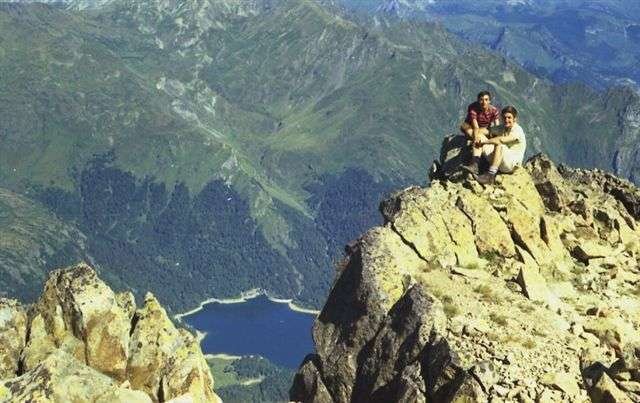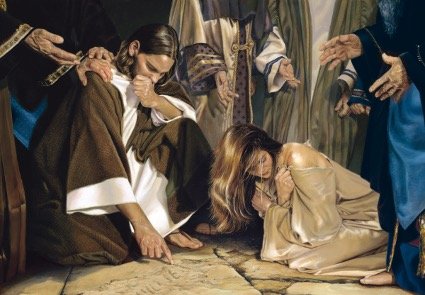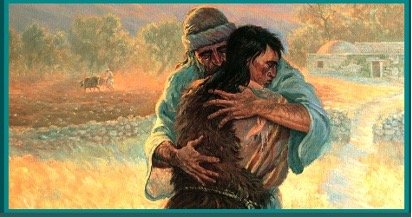
By F. Luis Casasus, General Superior of idente missionaries
Commentary on the Sunday Gospel of 28-5-2017, Solemnity of Ascension of the Lord (Acts of the Apostles 1:1-11; Letter to the Ephesians 1:17-23.; Matthew 28:16-20)
Definitely, the hardest part of our apostolic endeavor is the start-up phase: to climb the mountain. To make it clear to his disciples, He ordered them to go to the mountain.
It is only after this ascension when we can go, and make disciples of all nations, baptizing them in the name of the Father, and of the Son, and of the Holy Spirit, teaching them to observe all that He has commanded us.
The Psalm 24 asks: Who shall climb the mountain of the Lord, and who may stand in his holy place?
Mountains have both literal and symbolic significance in the scriptures. Isaac carried the wood for his sacrifice up Mt. Zion. Moses spoke to God in a burning bush on the craggy slopes of Mt. Sinai (Exodus 3) and where Elijah heard God’s “still small voice” (1 Kings 19).
Ezekiel had a vision where he saw the glory of the Lord rest on the mountain “to the east of Jerusalem,” later identified as the Mount of Olives. It is where Jesus went to pray alone and with his disciples, and from where he ascended after his resurrection. Sometimes Jesus climbed mountains to preach to the crowds (Mt 5:1), or to get away from the crowds (Mt 5:23). Jesus showed himself in divine glory on the summit of Mt. Tabor when he was transfigured before Peter, James, and John (Mt 17). And who appeared with Jesus? Those Old Testament mountain climbers mentioned earlier, Moses and Elijah.
Clearly the sacred writers understood the mountain to be a place where we truly encounter God and are satisfied– in word and teaching, in quietness and solitude, in light and glory, and in blood and sacrifice.
After Jesus’ disciples heard His Sermon on the Mount, they came down and changed the world. They were never the same. What changed them that changed the world? They heard the voice of God teaching them things that were completely contrary to what was being said in the valley, in their reflections, ruminations and daydreams.
What is the vision I have for a spiritual Ascension? Let us be clear:
- Do I see the daily Observance as a mere obligation and even a burden?
- Do I cherish and take note (yes: on a paper, or a computer file) of the impressions I receive in my prayer?
- Do I climb the mountain of my prayer as if I were the only one responsible of the hungry souls I meet in the valley? This makes a difference.
Just pay attention to the following story:
There were two warring tribes in the Andes, one that lived in the lowlands and the other high in the mountains. The mountain people invaded the lowlanders one day, and as part of their plundering of the people, they kidnapped a baby of one of the lowlander families and took the infant with them back up into the mountains.
The lowlanders didn’t know how to climb the mountain. They didn’t know any of the trails that the mountain people used, and they didn’t know where to find the mountain people or how to track them in the steep terrain.
Even so, they sent out their best party of fighting men to climb the mountain and bring the baby home.
The men tried first one method of climbing and then another. They tried one trail and then another. After several days of effort, however, they had climbed only several hundred feet.
Feeling hopeless and helpless, the lowlander men decided that the cause was lost, and they prepared to return to their village below. As they were packing their gear for the descent, they saw the baby’s mother walking toward them. They realized that she was coming down the mountain that they hadn’t figured out how to climb.
And then they saw that she had the baby strapped to her back. How could that be?
One man greeted her and said, “We couldn’t climb this mountain. How did you do this when we, the strongest and most able men in the village, couldn’t do it?” She shrugged her shoulders and said, “It wasn’t your baby.”
All the ascending experiences of our encounter with God are found in the Holy Mass. In fact, the whole structure of the liturgy is designed to be a gradual ascent, where each moment is “higher” by degrees.
Our first steps up the holy mountain are in the Entrance Rite, as we sing and welcome the priest “in persona Christi,” the person of Christ himself who climbs up with us. The Liturgy of the Word takes us higher, resting on a lofty plateau in the proclamation of the Gospel and the teaching of the homily. From there we begin our final ascent in the Liturgy of the Eucharist, the “summit of Christian life” (Lumen Gentium). Each step of the Eucharistic Prayer takes us higher until the Doxology, our Great Amen, the Lord’s Prayer, and our shared reception of the Body, Blood, Soul, and Divinity of Christ, our Paschal Sacrifice.
But we cannot remain there. God has other plans for us, just as he did for the Israelites when he ordered them to “leave the mountain,” assuring Moses that his Presence would go with them. Just before he ascended, Jesus sent his disciples to “go and make disciples” with the assurance that he would be with them “until the end of the age” (Mt 28:20). So they came down from the mountain and went to work.
Go, the Mass is ended. We are sent, off the mountain and into the world to bring others back with us to climb the mountain of the Lord.
He was a living example of this teaching in not only giving up His physical life, but in how He routinely laid down His life by humbly, compassionately serving the disciples and others with whom He came into contact. He made changes in His personal intentions, in His plans: in the Wedding of Cana, with the Canaanite woman, when He was interrupted.
Indeed, an overview of the Gospels shows that Jesus’ whole ministry looked like a series of interruptions. While at a dinner, he was interrupted by a sinful woman who began weeping at his feet. Trying to leave Jericho, he was interrupted by a blind man who would not stop shouting his name. About to speak to a crowd, he was interrupted by a man who wanted him to perform a healing. While responding to that interruption, he encountered woman who had been sick for over a decade and desired healing. Jesus was interrupted by lepers, children, religious leaders, sick people and just everyone else.
Yet over and over he showed patience and love. Because he loved people so much, interruptions did not seem like interruptions at all. He doesn’t even lose His temper. But He uses each occasion as a golden opportunity for some priceless teaching or wonderful miracle.
Finally, while Jesus was hanging on the cross, dying for our sins, someone dared to ask him for a favor: Remember me when you come into your kingdom. Even then, with nails through his hands and feet, Jesus did not seem to mind. He offered grace.
God makes use of the interruptions in our lives to catch our attention. He knows that we have schedules to keep and unavoidable work to do, but He wants us to look at Him. He wants our attention in the midst of all of that. Let’s pray and ask Him for the wisdom to discern what He may be trying to say through interruptions… this is not a technique.
Do I see God’s plan even when our plan we are accomplishing in what we think is God’s will is interrupted?
To be a disciple. In the Ascension, we contemplate on the exaltation of Jesus who now shares in the authority, power and glory of God the Father. St Paul tells us that this is our hope and all of us are called to share in the rich glories that Jesus has promised to us.
But the fact is that His kingship is still not fully established in creation. Consequently, the feast of the Ascension, while offering us hope to share in the kingdom, power and life of Jesus, also gives us a missionary charge to make disciples of all nations. Yes, we are called to be witnesses to Jesus.
Of course, in the work of conversion, we must ultimately realize that it is the work of the Holy Spirit. Only the Holy Spirit can empower us to carry out effectively the mission entrusted to us. For this reason, we must prepare ourselves for this baptism of the Holy Spirit in our lives. That was what Jesus advised the disciples.
Go therefore and make disciples of all nations: To be a disciple is not the same as being a student. A disciple is in relation to the master. A student is in relation to the teacher. The disciple lives with the master 24 hours a day; the student receives lessons from the teacher for a few hours then goes back home. The disciple presupposes a community.
I am with you always, even to the end of time: When Moses was sent to free the people from Egypt, he received a guarantee from God, the only guarantee that offers complete certainty: Go, I shall be with you! (Ex 3:12). It is the same certainty promised to the prophets and other persons sent by God to undertake an important mission in God’s plan (Jer 1:8; Jud 6:16).
Mary received the same guarantee when the angel said to her, “The Lord is with you” (Lk 1:28). The person of Jesus is the living expression of this guarantee, because his name is Emmanuel, God with us. He will be with his disciples, with all of us, even to the end of time. Here we see Jesus’ authority. Communication with our Lord doesn’t even need words. If I am open to His presence in my life, and live with a conscious awareness of his presence, I can experience fully that “Joy of the Gospel” about which Pope Francis spoke so warmly:
“Being a disciple means being constantly ready to bring the love of Jesus to others, and this can happen unexpectedly and in any place: on the street, in a city square, during work, on a journey. In this preaching, which is always respectful and gentle, the first step is personal dialogue, when the other person speaks and shares his or her joys, hopes and concerns for loved ones, or so many other heartfelt needs.
Only afterwards is it possible to bring up God’s word, perhaps by reading a Bible verse or relating a story, but always keeping in mind the fundamental message: the personal love of God who became man, who gave himself up for us, who is living and who offers us his salvation and his friendship.” (Evangelii Gaudium)










